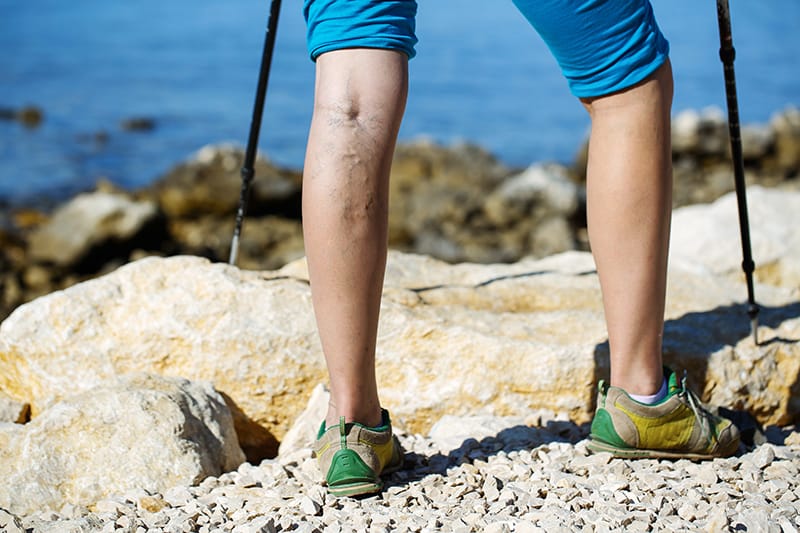It is completely normal to see your veins through your skin. And that is especially true when your blood pressure is up after a strenuous workout or when you’re caught in a frustrating traffic jam.
While some changes in vein appearance are completely normal, the look of your veins can also be a sign of a medical condition that needs treatment. This is more likely to be true when that change in appearance comes with pain, discomfort, itching, burning or restlessness.
Veins that look and feel different than they usually would often signal a problem with the vascular system, and can lead to bigger concerns than a squiggly blue line on your skin. Keep reading to learn more about the vascular system and examples of common vascular conditions.
A note from the vein experts at The Iowa Clinic: Vascular conditions are not something to self diagnose. We recommend completing our vein assessment form to start a conversation with one of our specialists and take the first step toward addressing your condition or cosmetic goals.
Vascular system? What's that?
Think about your neighborhood. There's a network of roads to get you everywhere you need to go. Each road has two lanes so you can travel in both directions.
Your vascular system works the same way. It's the network of veins and arteries inside your body, carrying blood everywhere it needs to go. Arteries carry the oxygen-rich blood from your heart to every last cell. Then veins carry it all back — except they have to make a couple pit stops in your kidneys and liver to dump waste before delivering the blood back to the heart.
Des Moines doesn't crack any “Cities With the Worst Traffic” lists. But as you know, a steady stream of traffic on 80/35 or I-235 can lead to a number of problems.
In your veins and arteries, there's a constant flow of blood traffic. A little congestion or road damage can lead to troubles throughout the whole vascular system.
Varicose Veins
Varicose veins are gnarled or enlarged veins that are like roads in need of repair. A weakening of the vein wall causes the structure to collapse and blood to pool up. You're left with what looks like twisted, dark blue or purple cords on your legs or feet. In addition to the unwelcome appearance, varicose veins can cause aching pains, discomfort and more serious medical concerns.
Spider Veins
Spider veins are more of a surface-level concern, like potholes. They're like varicose veins, but smaller. You can see the red, blue or purple veins under the surface of your skin. The web of twisted vessels appear most often in the legs and face due to increased pressure in the veins. Along with the cosmetic concerns, spider veins can cause heaviness, tiredness or swelling in your legs.
Chronic Venous Insufficiency
Chronic venous insufficiency occurs when damaged veins can't do their job, resulting in a traffic jam in your legs. The unhealthy veins are so weak, they can't fight gravity and deliver blood back to the heart. Instead of flowing up, blood starts to leak back down — going the wrong direction on a one-way street. Over time, the backed-up blood can cause pain, swelling, reddish brown skin and ulcers.
Other Vein Disorders
There are countless other conditions that can occur when your blood highway system gets damaged or weakened. Deep vein thrombosis and pulmonary embolism are a result of blood clots. An aneurysm is when your artery expands like a balloon due to a weak artery wall. Although many vascular conditions are treatable without surgery, a vascular surgeon is your best bet for medical help.
When in doubt about vein health, your best bet is to reach out for specialized care.
I don't need surgery. So why do I need a surgeon?
Even if you're seeking help for purely cosmetic reasons, a vascular surgeon is a better option than another vein specialist. While other health providers may offer some of the same treatments, they will direct most of their attention on clearing up your symptoms and issues of appearance. They don't have the in-depth knowledge of the vascular system to identify the source of the problem and its effects elsewhere in the body.
Vascular surgeons receive more training on the full range of vein conditions and therapies. They're board-certified experts on the entire vascular system who can help you make lifestyle changes, and can perform minimally invasive endovenous therapies. In severe cases, a vascular surgeon may recommend surgery for treatment of varicose or spider veins.
When in doubt, go see an expert.
From spider veins to the feeling that there are spiders in your veins, a vascular surgeon is the only specialist qualified to treat the full range of vein disorders. Their knowledge extends far beyond the operating room; they understand how the whole map of interconnected veins and arteries works, so they can help you find the underlying issues and clear up your condition.
Complete our vein assessment to get in touch with an expert at The Iowa Clinic.
